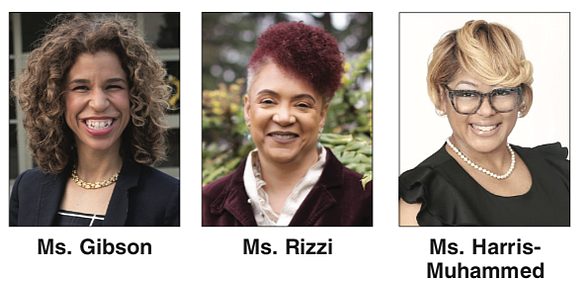School Board members introduce teacher collective bargaining resolution
Jeremy M. Lazarus | 10/14/2021, 6 p.m.
Is collective bargaining coming to Richmond Public Schools?
Three members of the Richmond School Board—Kenya J. Gibson, 3rd District; Stephanie M. Rizzi, 5th District; and Shonda Harris-Muhammed, 6th District—are leading the charge to make it happen.
With the backing of the Richmond Education Association, which represents teachers and other schools employees, the trio has introduced a resolution authorizing RPS employees to organize and bargain for a contract.
It is unclear whether the trio can find two other School Board members to back the idea and so craft a majority of the nine-member board to support it. The decision could come as soon as the next meeting Monday, Oct. 18, according to Ms. Gibson.
The Richmond initiative grows out of a change in state law that went into effect last May. The change authorizes governing units such as school boards or city councils to authorize employees to organize and negotiate with administrations for contracts.
The School Board is the first element of Richmond’s government to consider boosting employee clout laying out contract terms.
Currently, the REA can recommend contract terms, but the final contracts are solely within the power of the administration, now led by Superintendent Jason Kamras.
Mr. Kamras and his executive team have not signaled their view on collective bargaining, although Mr. Kamras has received kudos for consulting with the REA before issuing new contracts.
As presented, the resolution would allow the REA or some other entity to become the exclusive representative to bargain on contract terms if a majority of RPS employees approve that entity.
State law would still bar strikes. And with Virginia being a “right-to-work” state, employees could not be required to pay dues to support the REA or any other entity and could withdraw permission for dues to be paid from their salaries at any time.
However, if contract talks broke down, RPS and the employees’ representative would be required to go to mediation to seek a settlement. If mediation fails, they would have to submit their differences to an arbitration panel.
“We can use the new powers given to us by the state legislature to forge a forward-thinking example for the provision of public sector collective bargaining” in Virginia, Ms. Gibson, Ms. Rizzi and Ms. Harris-Muhammed wrote in announcing the introduction of their proposal in late September.
In their view, “This is common sense. A teacher’s working conditions are a student’s learning conditions. When educators have job security, they are better able to advocate on behalf of their students. It is far past time for public school workers to be able to better advocate for themselves, and in doing so, strengthen our public schools.”
During the public comment period at the Oct. 4 School Board meeting, advocates cheered the idea and urged the full board to adopt the plan.
Paige N. Ellwanger, an English-as-a-second-language teacher, expressed the views of many in telling the board that collective bargaining would end the “take it or leave it” approach that teachers now face with their contracts. Collective bargaining, she said, would provide a seat at the table so that the final contracts would be a win-win for everyone.
Teachers Anne Forrester and Stephen Straus said collective bargaining could reduce teacher burnout. Ms. Forrester said she and others are working 10-hour days and need at least an hour shorter workday that likely would be possible only if teachers could collectively negotiate contract terms with the administration.
Other speakers noted that the pandemic has eliminated planning periods and break times for teachers, including lunch, without any provision for compensation that a contract would require.
A preschool teacher said the school day has been extended without any negotiation, and she and others are now expected to work evenings after the school day has ended.
However, in the view of School Board member Jonathan M. Young, 4th District, that is no reason to go for the “nuclear option” of collective bargaining.
“The teachers are raising issues that need to be addressed,” Mr. Young said, in responding to a Free Press query and becoming the first to publicly speak against collective bargaining. “I agree with them that working conditions need to be improved, and I have been strongly supportive since coming on this board.”
But he said that the board can address the issues with policy and budget changes. Approving collective bargaining, in his view, would be akin to using a sledgehammer to crack a walnut when more appropriate tools are readily available.
“I think we can do better as a school district for our employees without it,” he said.







